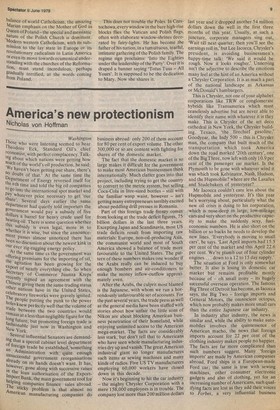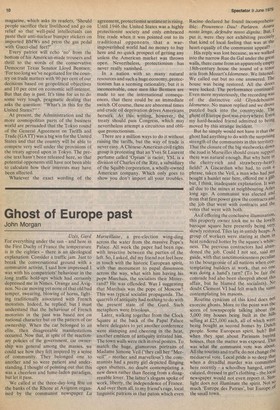America's new protectionism
Nicholas von Hoffman
Washington Those who were listening seemed to hear Theodore Eck, Standard Oil's chief economist, with perfect complacency. Talking about which nations were getting how much of the world's oil production, he said: We haven't been getting our share, there's no doubt of that.' At the same time the Department of Energy reversed itself for the nth time and told the big oil companies to go into the international spot market and Pay whatever price necessary to get 'our share'. Several days earlier the same department had quietly told importers the government would pay a subsidy of five dollars a barrel for heavy crude used for heating oil. There is some question whether this subsidy is even legal, more as to whether it is wise, but since the announcement passes almost unnoticed there has been no discussion about the newest kink in our ever zig-zagging energy policy. At the same time zs the government was Offering premiums for the importing of oil, the agitation has been growing for the "Port of nearly everything else. So when Secretary of Commerce Juanita Kreps recently signed an agreement with the Chinese giving them the same trading status Other nations have in the United States, celebratory fireworks were gravely ignited. The people putting the punk to the power holes knew perfectly well that the volume of trade between the two countries would remain at a less than negligible figure for the long future, but promoting foreign trade is fashionable just now in Washington and New York. Several influential Senators are demandmg that a special cabinet level department of foreign trade be established, 'something an Administration with quite enough unsuccessful government reorganisations already on its hands doesn't want. It has, however, gone along with successive raises in the loan authorisation of the ExportImport Bank, the main government tool for helping companies finance sales abroad. The sticky problem is that almost no American manufacturing companies do business abroad: only 200 of them account for 80 per cent of export volume. The other 300,000 or so are content with fighting for shares of the domestic market.
The fact that the domestic market is so large makes it difficult for the government to make most American businessmen think internationally. Much clatter goes into that project, including trying to get the country to convert to the metric system, but selling Coca-Cola in litre-sized bottles — still with the familiar wasp waist, however — isn't getting many entrepreneurs terribly excited about peddling drill presses in Romania. Part of this foreign trade frenzy comes from looking at the trade deficit figures, 75 billion dollars in the last three years. Excepting Japan and Scandinavia, most US trade deficits result from importing raw materials: Europe, non-oil-producing Asia, the communist world and most of South America showed a balance of trade more favourable to the United States. The pattern of these numbers makes one wonder if the Arabs really can be induced to buy enough bombers and air-conditioners to make the money inflow-outflow approximately even. After the Arabs, the culprit most blamed is the Japanese, with whom we run a horrendously unfavourable set of accounts. For the past several years, the trade press as well as the general media have been stuffed with stories about how unfair the little sons of Nikon are about blocking American business penetration of their homeland, while enjoying unlimited access to the American mega-market. The facts are considerably less stark, but don't tell that to Americans who have seen whole manufacturing industries dry up and vanish. The great American industrial giant no longer manufactures such items as sewing machines and many kinds of radios. Five US TV manufacturers employing 60,000 workers have closed down in this decade.
Now it's beginning to hit the car industry — the mighty Chrysler Corporation with a mere 158,000 employees is in trouble. The company lost more than 200 million dollars last year and it dropped another 54 million dollars down the well in the first three months of this year. Usually, at such a juncture, corporate managers sing out, 'Wait till next quarter; then you'll see the earnings roll in,' but Lee Iacocca, Chrysler's president, is avoiding businessmen's happy-time talk: 'We said it would be rough. Now it looks rougher.' Unnerving isn't the adjective to describe the emotions many feel at the hint of an America without a Chrysler Corporation. It is as much a part of the national landscape as Arkansas or McDonald's hamburgers.
This is Chrysler, not one of your alphabet corporations like TRW or conglomerate hybrids like Transamerica which must ceaselessly advertise but are never able to identify their name with whatever it is they make. This is Chrysler of the art deco cathedral in New York, the Chrysler building. Texaco, 'the firechief gasoline,' Goodyear, the Indy 500 — this is Chrysler man, the company that built much of the transportation which took America down the road marked '20th century', one of the Big Three, now left with only 10.9 per cent of the passenger car market. Is the Plymouth to be gone with whatever wind it was which took Kelvinator, Nash, Hudson, and the Hupmobile? where are the Lasalles and Studebakers of yesteryear?
Mr Iacocca couldn't care less about the Hupmobile and yesteryear. It's this year he's worrying about, particularly what the new oil crisis is doing to his corporation, which is nose-deep in large, low-mileage cars and very short on the productive capacity to make the suddenly sexy, fueleconomic numbers. He is also short on the billion or so bucks he needs to develop the new lines. 'Everybody is moving to small cars', he says. 'Last April imports had 15.5 per cent of the market and this April 22.6 per cent. We're plumb out of four cylinder engines. . . down to a 12 to 15 day supply.'
The situation at Ford is only somewhat better. It also is losing its domestic car market but remains profitable mostly because of — oh small irony — its hugely successful overseas operation. The famous Big Three of Detroit has become, as Iacocca says, the Big Two — foreign imports and General Motors, the omniscient octopus, which now probably makes more small cars than the entire Japanese car industry.
In industry after industry, the news is similar and, while the ability to make automobiles involves the quintessence of American macho, the news that foreign imports account for 22 per cent of the clothing industry makes people no happier. The facts are far more complicated than such numbers suggest. Many 'foreign imports' are made by American companies abroad. Ford ships in a European-made Ford car; the same is true with sewing machines, other consumer electronic gadgets and also of clothing, yet for an increasing number of Americans, such qualifying facts are lost as they add their voices to Forbes, a very influential business magazine, which asks its readers, 'Should people sacrifice their livelihood and go on relief so that well-paid intellectuals can paste their anti-nuclear bumper stickers on imported BMWs and press the gas pedal with Gucci-clad feet?'
Every patriot will echo 'no' from the bottom of his American-made trousers and thrill to the words of the conservative Democrat Texas Senator Lloyd Bentsen: 'For too long we've negotiated for the country on trade matters with 90 per cent of our decisions based on geopolitical objectives and 10 per cent on economic self-interest. But that day is past. It's time for us to do some very tough, pragmatic dealing that asks the question: "What's in this for the United States?" ' At present, the Administration and the more cosmopolitan parts of the business world are persuaded that the Tokyo round of the General Agreement on Tariffs and Trade (GATT) was a big win for the United States and that the country will be able to compete very well under the provisions of the treaty agreed upon in Tokyo. The precise text hasn't been released here, so that potential opponents still have not been able to calculate how their interests may have been affected.
Whatever the exact wording of the agreement, protectionist sentiment is rising. Until 1946 the United States was a highly protectionist society and only embraced free trade when it was pointed out to its traditional opponents that a warimpoverished world had no money to buy here and no quick prospect of getting any unless the American market was thrown open. Nevertheless, protectionism has never really vanished.
In a nation with so many natural resources and such a huge economy, protectionism has a seeming rationality, but it is inconceivable, once men like Bentsen are made to see the international consequences, that there could be an immediate switch. Of course, these are abnormal times and crude oil deprivation drives Americans berserk. At this writing, however, the treaty should pass Congress, which may nevertheless attempt a circuitous and oblique protectionism.
There are a million ways to do it without raising the tariffs, but the way of trade is never easy. A Chinese-American civil rights group is protesting that an Yves St Laurent perfume called 'Opium' is racist; YSL is a division of Charles of the Ritz, a subsidiary of the Squibb corporation, a wholly-owned American company. Which only goes to show you don't import all your troubles.











































 Previous page
Previous page